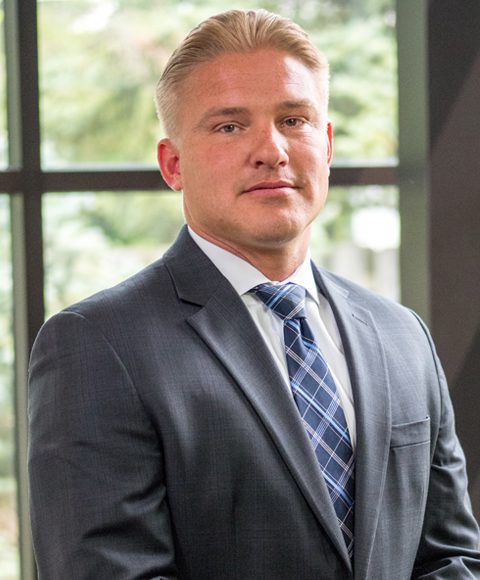Forming a military law practice was natural for veteran lawyers.
 After graduating from the University at Buffalo School of Law in 2006, Robert Singer went to boot camp in Jacksonville where he got his start in the JAG Corps.
After graduating from the University at Buffalo School of Law in 2006, Robert Singer went to boot camp in Jacksonville where he got his start in the JAG Corps.
That spawned a nearly decade-long military career, which included a plethora of legal positions and travels that would take him from Florida to Virginia Beach to Pearl Harbor.
Singer served on active duty as general counsel, naval prosecutor, Special Assistant U.S. Attorney and as a military defense attorney.
After returning to Buffalo last year to take a position at Rupp Baase Pfalzgraf Cunningham, he looked for opportunities to expand its practices. Since he enjoyed working with service members and veterans as a military officer, he has an appreciation for their contributions and wanted to see them afforded the rights they deserve.
Forming a military and veterans law practice at the firm seemed like a natural fit. These days he represents enlisted service members and military officers accused of misconduct or substandard performance as part of court-martials, Article 15/Non-judicial punishment proceedings and before administrative separation boards and boards of inquiry.
“What initially drew me to it was not only did I have the experience for this practice, but it’s also something that is very fulfilling,” Singer said. “Representing anybody is always a fulfilling path, but when you represent somebody who may have gone on seven different deployments overseas over the course of 20 years or who has made enormous sacrifices for this country, they may be in a situation where they may lose their retirement or something they’ve worked so hard to get. Those are cases you really want to get involved in and make a difference.”
It’s a specialized area of law so his background in military jobs and serving at an administrative level helped him break into it. By his side at the firm and helping to spearhead the efforts are two former soldiers who are now associates plus managing partner David Pfalzgraf, a Navy veteran.
“Oftentimes nobody realizes that the military language is its own separate entity,” Singer said. “You really don’t understand it if you’re not in the military. And on top of that, all of the services speak their own language, too, so it’s really important to have those different experiences at a firm so you can relate.”
It can be difficult to document a case when a client is dealing with severe service-related injuries or issues, according to Singer.
“Being able to relate to those individuals, gain their confidence that you know what you’re talking about and speak their language, it helps them open up,” he said.
When Anthony Kuhn, who was recently named managing partner at Tully Rinckey’s Buffalo office, got involved in the practice a few years ago, he thought it would encompass mostly VA-related matters and service-connected disability compensation, but it’s much more.
He has handled medical and physical evaluation board ratings, traveled around the country for ROTC disenrollment hearings and litigated security-clearance cases through the Department of Hearings and Appeals for the State Department. He also has been involved in preparing clients for military justice and court-martials.
“It’s a lot more than I anticipated when I first got involved in the practice but I love it,” said Kuhn, who graduated in 2015 from the University at Buffalo Law School after a nearly 20-year military career that included leadership posts. “There are constantly moving parts, I got to do some traveling and I get to represent my people — that’s the best part about it.”
The ability to relate to clients is critical, according to Kuhn, and makes it easier for him to convince military clients that he will advocate for them. He’s even represented people he knows personally, one of whom was a fellow combat veteran with a retirement issue.
Kuhn has served in leadership positions at military installations nationwide and as an embedded intelligence adviser for the New Iraqi Army during Operation Iraqi Freedom. He trained and supervised thousands of soldiers in armies in two different countries and still serves as an Army Reserve first sergeant in Amherst.
“Not only is he a friend of mine but he’s a fellow combat veteran,” Kuhn said, referring to the client. “He’s exactly the type of soldier I wanted to represent when I got involved in this practice area. And I get to do that now.”
Common matters handled by military law attorneys include criminal cases and court-martials, sexual assault allegations, employment law, ROTC disenrollment, security clearances and failures of drug tests.
During a court-martial, which is similar to an indictment or arrest of a civilian, a defendant has the right to counsel once he or she is being investigated but doesn’t have the right to assigned counsel or a JAG officer until official charges are brought, Kuhn said. For civilians, a defendant has the right to assigned counsel once there is an investigation.
So attorneys like Kuhn can get retained privately by soldiers to come between them and the investigators.
“Often we can take control and make sure that there aren’t any injustices that might have occurred had there not been any attorney involved,” he said.
Sexual assault is something the military and Congress take a hard look at, according to Singer. He saw that firsthand during his time as senior special victims prosecutor in the military.
“It presents various cases where they’re very difficult decisions for juries to make,” he said. “The last thing you want to have is someone get convicted of a crime for perhaps making a mistake or doing something short of criminal.”
Kuhn said he’s noticed a rise in these types of claims. He was recently in Fort Drum where he went before an administrative separation board for a hearing on a similar matter.
“Sometimes we’re able to get involved at that step and go through what is like a mini-trial,” he said.
Matters involving the Board of Inquiry or Administrative Separation Board come up when soldiers have issues related to keeping proper standards, such as in fitness or discipline. Singer said everyone is entitled to a fair process. He has seen cases where soldiers faced scrutiny nearly 20 years into their service, close to retirement and a pension.
“You don’t want to see a situation where they are arbitrarily fired from their job,” he said.
He also represents soldiers seeking an honorable discharge, which is essential in obtaining benefits for which they are eligible once their service is complete.
Due to misconduct, an ROTC candidate can be recommended for disenrollment, Kuhn said. However, commanding officers often struggle to do the right thing and may not have enough research, guidance or experience to make this type of decision. He said a hired attorney is allowed to be in the room during the hearing and offer assistance and guidance to the cadet before the hearing but cannot advocate for the client during it.
According to Singer, without good credit, a soldier cannot garner security clearance. When a soldier makes bad decisions with credit cards and investments or has a house foreclosed on, it could wind up costing them their security clearance and job. As an attorney in these matters, Singer explains to an administrative law judge or panel of officers that the individual is still reliable and should retain his or her security clearance.
Kuhn said a hired attorney can respond early in the process to the statement of reasons from the government why an individual should not be granted security clearance and possibly save the client time and money. He also has represented clients all the way through the process, including in a hearing before the Defense Office of Hearings and Appeals, if necessary.
“If you can properly respond to the government’s statement of reasons, you can mitigate the concerns of the Department of State or work with government counsel to get security clearances granted or extended,” he said.
A security clearance is also necessary for civilians who work for the Department of Defense or with a government agency, and military lawyers represent them during administrative hearings.
In cases of failure of urine analysis, Kuhn said sometimes there can be an innocent ingestion of something like a medication and other times it could be a false positive. He said his work includes involving a toxicologist in these cases, drafting a written response, making sure the sample is retested and challenging the results of the test.
The work of military law attorneys does not end there. Both Singer and Kuhn help soldiers by volunteering their time locally. Kuhn is a member of the Committee for Veterans and Service Members of the Bar Association of Erie County. Singer is a mentor at the Buffalo Veterans Treatment Court, meeting with veterans once or twice a month who need legal help.
Singer interned for Erie County Family Court Judge Lisa Bloch Rodwin, who at the time worked in the Domestic Violence Bureau of the Erie County DA’s Office. After Singer left the area, Judge Robert Russell started the first Veterans Treatment Court in 2008. Rodwin sent Singer an email to let him know about the court.
“I told her if I ever come back to Buffalo, I’ll be a mentor in Veterans Court,” Singer said.
Later, when he returned to Buffalo, Rodwin was the first person he went out to lunch with and she reminded him of what he said. Sure enough, shortly after he found himself in Russell’s courtroom fulfilling his promise.





